Lately, I have noticed hoards of Brewer’s Blackbirds congregating in the trees around the ten-acre ranch. They make their arrival well known as they fly in, finding perches in the tallest of trees, and making quite a racket all the while. I used to find the clamor of chatter and “chucking”, accompanied by shrill squeals, quite annoying. Back then, I would really get twisted up when a black mass of them fluttered down, quite gracefully I admit, and begin foraging on the ground around my bird feeders, and especially when they began running off the pretty songbirds. To me, these noisy beasts swarmed in like a black plague descending on the pasture, woodlands and yard.
This year, while I participated in the Oklahoma Department of Wildlife’s Winter Bird Survey, I noticed more of the Brewer’s Blackbird population visiting our property and feeders than any winter in recent memory. Noticing this phenomenon, I did a little research on the species, and was relieved to know they were only a winter visitor to this area. Viewing them with my binoculars, I was surprised to note the male blackbirds were really quite appealing – glossy black all over contrasting with a staring yellow eye and a blue sheen on the head, then graduating to greenish iridescence on the back. I still did not appreciate a crowd of them moving in on the pretty songbirds at the feeders, but I guessed since they spent an equal amount of time foraging in the woodlands and pasture for seeds and insects, I could put up with them for the winter months.
Then one evening at dusk last week, I saw a lone, male Brewer’s Blackbird perched on the wildlife water tub at the bottom of our slope. As I approached I was amazed to find it did not fly away. I spoke softly to it and still it did not move, even as I drew closer. Now just a few feet away, I knew something must be wrong. Was it blind, I wondered? But as I reached to grab it, the bird flew off towards the neighbor’s bottom-land where he promptly careened into a fence and flopped onto the ground near a brier patch. Seeing this, I was sure the bird was ill, and supposed before nightfall that Ms. Foxy would likely make a meal of him.
But the next day, the blackbird had returned to the water tub and seemed just as tame as the evening before. I told FD about it, and the two of us approached the bird as it perched on a downed log near the wildlife feeder. After flying off short distances a couple of times, the blackbird finally landed in a grassy area. I was able to distract the bird from the front, while FD snuck up behind him and gently captured him. Back at the house, we quickly realized our friend was very constipated. The vent area was completely caked with poo. I cleaned the tail feathers with warm water, and used a soft cloth to soak and wipe the hardened feces away from the vent, but the cloaca was swollen and quite hardened. FD worked for a long time trying to gently remove the foul-smelling feces, but the bird was compacted far enough within the intestinal tract that it was impossible to dislodge the mass. The few kernels of poo that he did manage to extract were hard as rocks. And because the bird did not show signs of distress, it made us wonder if he had already become toxic. Doing the best we could to remove what was visible, we set our patient back out at the water tub which I had cleaned and sanitized the night before. The weather was warm and sunny. Perhaps our friend could spend the day recuperating and hopefully, healing.

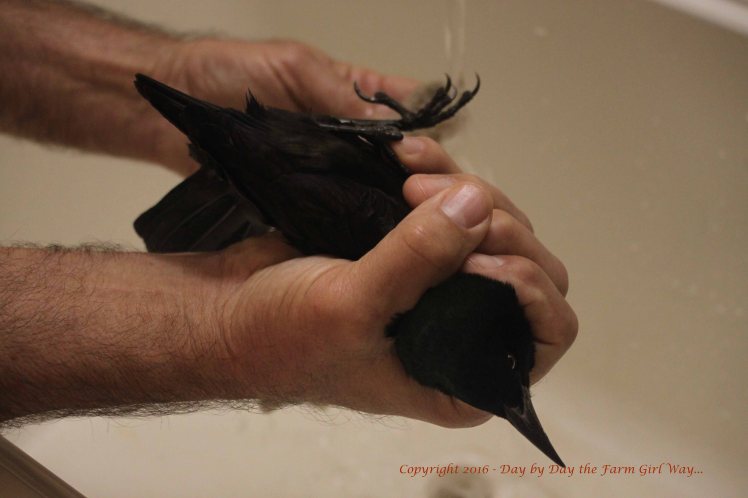
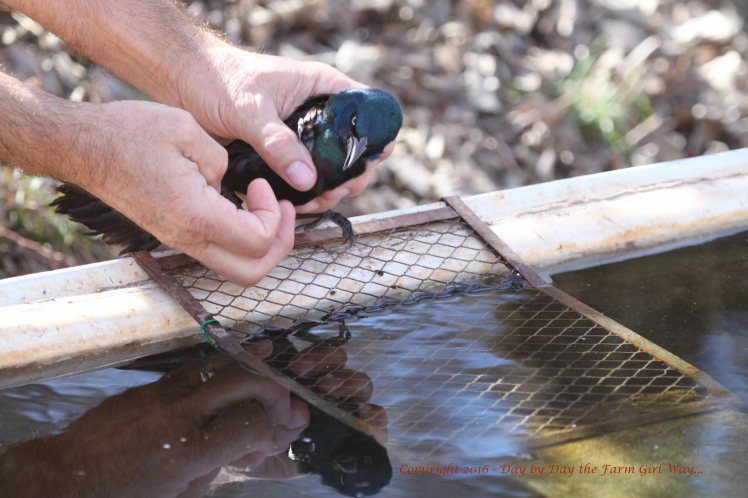
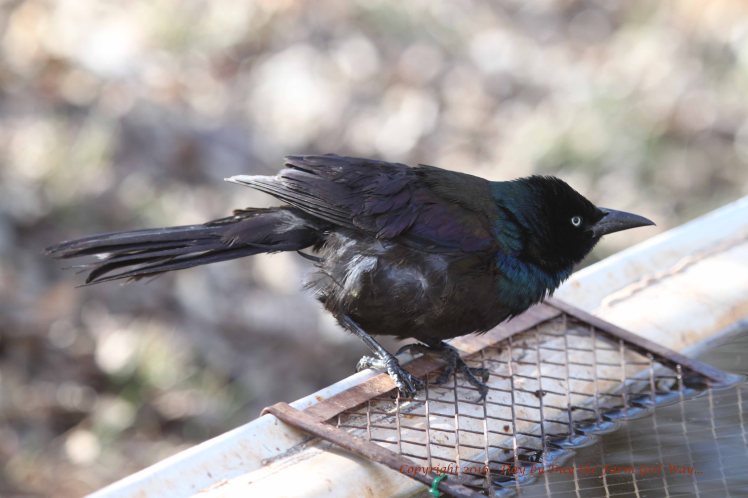
Later in the afternoon, the blackbird had moved from the tub to a few feet up the hill, where he hid himself under a tree root. When I approached, he put his visible wing out and down as if to hide or shield himself. I thought this was a good sign. Maybe the fox would not see him in this area, and he would still be close to his water source. But by early evening when I took my camera down to photograph him, I found him lying dead, halfway between his hiding spot and the water tub.
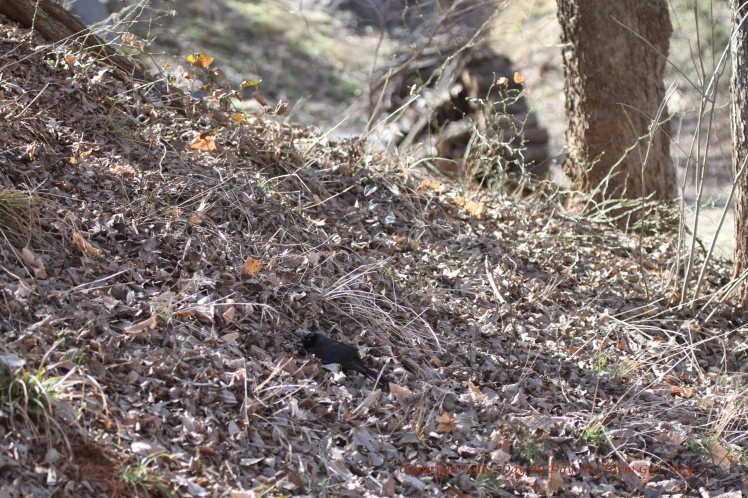
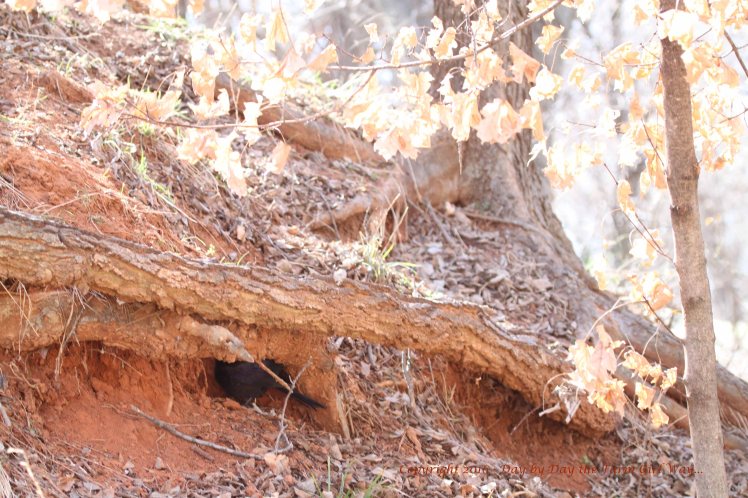
Looking over my photographs of the Brewer’s Blackbird, I marvel at his beauty. I feel fortunate that he allowed us to hold him, as it is always an experience of amazement and wonder to hold a wild creature. It was a learning experience to investigate and determine what kind of help he needed, even though I am sure it was too late to do any good. Since his death, I have researched more extensively, what more we could have done. Death does not mean failure in wildlife rescue. All assistance is offered as kindness, and all encounters offer a learning experience. In this regard, our friend did not live his life in vain. Rather, he provided the gift of appreciation of a species of bird we often regard as a nuisance bird… and he allowed FD and me the opportunity to gain knowledge from yet another wildlife rescue experience.
© 2016 Day by Day the Farm Girl Way…


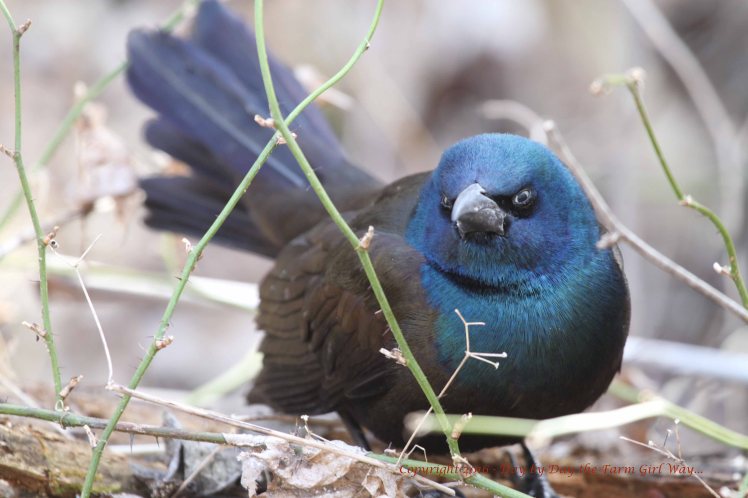

there are no words, such elegant, beautiful images and organized…
Just beautiful and amazing words – please follow and like my new piano page, I appreciate it https://mihranpiano.wordpress.com
LikeLike
Thank you… and I’ll be happy to visit your new page! 🙂
LikeLike
Mixed feelings… sad that the bird didn’t make it, but such beauty you captured up close!
LikeLike
I understand the sad feeling. I learned long ago that with rehabilitation and rescue, doing anything in kindness and caring is what the experience is about. I always thank the animal for the experience, and hope that next time I am better prepared or I have a little more knowledge under my belt.
LikeLiked by 1 person
You paid tribute to him beautifully Lori 🙂
LikeLike
Thank you, Fran. He was a beautiful bird.
LikeLike
How wonderful that you cared so much and tried! 🙂 Stay caring and perceptive!
LikeLike
Yes, Tom, and wouldn’t it be wonderful if all people cared and “tried” not only with animals, but with each other as well. 🙂
LikeLiked by 1 person
Yes! 🙂
LikeLike
It’s a very beautiful story. I don’t live on a farm or on acres of land, but every summer, no matter where I am, I seem to encounter the death of a bird. It saddens me every time. They are such beautiful creatures. Thank you for sharing.
LikeLike
Thank you, and you brought up an interesting observation. Just the last month I have counted more than eight dead birds on our property. I have seen one or two other years, and chalked it up to natural causes, but this many seems odd. They’re all different species, except for three white-winged doves.They do not seem to be injured, and they have no missing parts nor are they ruffled up. I suspect since nearby lawns are being sprayed for spring weed control, it could be due to airborne chemical. That makes me sad.
LikeLike
My goodness, that does seem like a lot of dead birds. I’d guess you’re probably right about a chemical cause, and that makes me sad too. Our society uses far too many unnecessary chemicals to try and “tame” nature into sanitized lawns that don’t provide habitat for insects or other creatures. By the way, have you ever heard of the Lawn Reform Coalition? I like what they’re doing. (https://www.facebook.com/Lawn-Reform-Coalition-136718253008193/)
LikeLike
Sobering, yet beautiful. You and FD offered kindness and help, and regardless of the outcome, it was a learning experience that touched you (and your patient) in a special way. So proud of you both, Sister!! It warms my heart how you care for all the creatures, big and small, that find their way onto your place.
LikeLike
I know… sometimes I suspect the animals and birds have some kind of communication going on to alert the ill or wounded to visit our place when they need help!! Hmm, I seem to remember a little girl in our house who took in all sorts of cats and kittens and nursed them to health, picked up strays, and adopted rescue cats and dogs. You wouldn’t happen to know anything about that, would you? Ha ha!
LikeLiked by 1 person
I lost a baby chick to this problem in summer. I never knew a grown bird could get ‘pasty butt’ (as we call it in chickendom).
Every year at the winter solstice I have the unhappy experience of birds crashing into the south facing window in our dinning room. Weirdly, it is always at the solstice, and always in late afternoon. So far all of them, though knocked silly and in some cases completely knocked out, have recovered and flown away. I picked them up and carried them to a tall vine covered tree stump away from the cats. This year it was a male Cardinal and I really thought he was going to be OK. However, this time, as in your case, I found him expired in the morning. We do try our best, but sadly, sometimes it just isn’t enough.
They are wild and frightened and I wonder each time I have them in my hands if on some level they do understand that I mean them no harm.
LikeLike
Thank you for sharing that Lynda. Pasty butt is something we occasionally dealt with in raising chickens too.. I’d just never dealt with it in a wild bird before. I truly think the poor thing was already toxic from dealing with it for too long. He was also very calm which is never a good thing. And I know it sounds wacky but I do feel that all living things read our energy. I think they understand or feel the energy we put out. And certainly, the manner in which we handle them has a lot to do with their reaction as well.
You know, I remember while I visited you a couple of birds hit that window. That’s very strange. Here, it has happened too, but I’ve never paid attention to the time of year.
LikeLike
Another amazing experience. The Case of the Costive Blackbird. Sounds like a Sherlock Holmes story.
LikeLike
Oh my goodness! Only you could come up with an investigative idea on this story!! Ha ha!! I admit I had to look the word costive up! Is that something you knew from your nursing background? 🙂
LikeLiked by 1 person
No, I cheated! I wanted to find a fancier word than Constipated!
LikeLiked by 1 person
Ha ha!! We both learned a new word then!! 😀
LikeLiked by 1 person
You and FD really went the distance to help that sweet little friend. That’s what’s important. We can never predict outcomes but if one never helps then…? As always captivating and beautiful photos. ❤
LikeLike
Thank you, Paulette. I never realized the beauty of the Brewer’s Blackbird until this fella came along. I appreciate them so much more now that I know more about their habits. I’m always learning. 🙂
LikeLike
You and FD have such kind and compassionate hearts, caring for God’s creatures as you do.
LikeLike
Thank you, Audrey. We all have our niches in helping others, don’t we?
LikeLike
I truly believe we are all measured by the kindness we share that is unrequested.
LikeLike
That was a very nice thing to say, Charlie. Thank you. 🙂
LikeLike
from the poetry of Wallace Stevens:
I
Among twenty snowy mountains,
The only moving thing
Was the eye of the blackbird.
II
I was of three minds,
Like a tree
In which there are three blackbirds.
III
The blackbird whirled in the autumn winds.
It was a small part of the pantomime.
IV
A man and a woman
Are one.
A man and a woman and a blackbird
Are one.
V
I do not know which to prefer,
The beauty of inflections
Or the beauty of innuendoes,
The blackbird whistling
Or just after.
VI
Icicles filled the long window
With barbaric glass.
The shadow of the blackbird
Crossed it, to and fro.
The mood
Traced in the shadow
An indecipherable cause.
VII
O thin men of Haddam,
Why do you imagine golden birds?
Do you not see how the blackbird
Walks around the feet
Of the women about you?
VIII
I know noble accents
And lucid, inescapable rhythms;
But I know, too,
That the blackbird is involved
In what I know.
IX
When the blackbird flew out of sight,
It marked the edge
Of one of many circles.
X
At the sight of blackbirds
Flying in a green light,
Even the bawds of euphony
Would cry out sharply.
XI
He rode over Connecticut
In a glass coach.
Once, a fear pierced him,
In that he mistook
The shadow of his equipage
For blackbirds.
XII
The river is moving.
The blackbird must be flying.
XIII
It was evening all afternoon.
It was snowing
And it was going to snow.
The blackbird sat
In the cedar-limbs.
LikeLike
I like the imagery of this poetry, but I admit, I ended up researching several analyses for a better perception or understanding of the meaning of each stanza. In the end I’ve decided poetry is not simple and obvious. And I decided I simply enjoyed the created imagery of the Blackbird poem. It doesn’t need to be more complicated than that! 🙂
LikeLike
Thank you for sharing this story. Your sensitivity and awareness help us to become more sensitive and aware too. I hate to think that some of these birds might be succumbing to weed sprays and the like. Chris and I have decided not to use the nasty stuff needed to get rid of our Canada thistle (at least not for now) for just this reason. Our native birds love that thistle, as do the bees. So how can we justify it? On the other hand, it’s an invasive weed and there are laws about how to handle such things on one’s property here in Montana. The answers are seldom easy!
LikeLiked by 1 person
We have the Musk Thistle here, which is a noxious weed probably like your Canada thistle. We hand dig them since they are invasive and go to seed in no time. We’ve managed to control them rather well this way. We quit using chemical five years ago when Daisy deer came into our lives. I used to eradicate poison ivy and cat brier on our land too, but now that I know deer actually eat those plants, we let them go wild too. I am hoping one day we can manage to purchase more native wild flowers and grasses. It’s a wonderful thing to attract the native birds and draw wildlife to our land. It took a couple of years after we quit using chemical to see the bees make a comeback. Nature is resilient. 🙂
LikeLiked by 1 person
Yes! That’s good enough! Besides, you already are in a bonded, superb relationship with blackbirds! 🙂
LikeLiked by 1 person
🙂
LikeLike
That is a beautiful post Lori, albeit a very sad post at that. It’s wonderful how you and FD are constantly helping the wildlife around you 🙂
And it’s great to see and hear someone appreciate some of the more common birds (the Brewer’s Blackbird would be a very rare bird in the UK of course, with probably thousands of twitchers descending on it, if ever one was seen here! Lol!). In the UK, most people take starlings and magpies both for granted, but both have amazing plumages when looked at properly, and both are often great to watch. It seems that you have certainly come to respect your Brewers Blackbirds a lot more now 🙂
LikeLike
Thank you, Andy. Starlings aren’t liked much here either! Every time I have had a close encounter with some species of animal or bird, I come to have an appreciation for it in some way. Usually, a little research will change my attitude to gratitude! 🙂
LikeLiked by 1 person
It is brilliant how as you say, looking into any type of animal or bug, will often change our attitudes to them. Just a shame I can’t convince my wife about that when it comes to spiders, or most insects for that matter! Lol!
LikeLike
Hello Andy. Sometimes it takes something special to help us appreciate a certain species that we fear. I feared snakes for years, until we moved here and they were everywhere! It was apparent I had to learn to co-exist. While I’m still not fond of them, I do appreciate that they keep the rodent population down. I’ve learned to shoo them away when I’m working in an area they inhabit. And spiders always alarmed me too, but we have so many on the porches and in the woods, that I no longer fear them. In fact, the large garden orbs are allowed to make their webs just about anywhere and I’m pretty ferocious about protecting them! 🙂
LikeLiked by 1 person
Sorry for taking so long to reply Lori, it’s been a very hectic last few weeks.
That’s brilliant that you have looked rationally at your fears, and have managed to overcome them – like you said, if you hadn’t, you would never leave your house where you live now! I love the fact that you now are ferocious about protecting the orb spiders in your garden, it’s brilliant!! 🙂 🙂
LikeLike
It has been busy here too, Andy. That’s exactly why I haven’t been posting much lately. Raising Daisy deer taught me so much about slowing down to notice the little things, and to overcome some fears as a result. I cannot stress enough about how living in the moment calms us, and causes us to focus only on the moment at hand. So much of our fear is just crazy ideas about lies we tell ourselves – in the case of nature, species that are feared, simply because they are ugly or threatening-looking! 🙂
LikeLiked by 1 person
That’s a great philosophy to have Lori, far too many people spend far too much time worrying about things that may happen in the future! And you’re right about much of our fear about things is due to silly ideas we tell ourselves – I really dislike going to the doctors or to hospital, but I have no real justification for this feeling. And as to nature, I reckon 98% of the people in the UK who say they don’t like spiders, do so because our common house spider just looks so ugly, poor little bu**er! 🙂
LikeLiked by 1 person
Well said, Andy!!! 😀
LikeLiked by 1 person
Thanks Lori 🙂
LikeLike
🙂 You betcha!!!
LikeLiked by 1 person
🙂
LikeLike
Dear Lori,
Once again I was moved by another account of your interaction with a wild creature and it brought back memories of my own experience with a bird that I had often regarded with annoyance. Black torresian crows make loud cawing sounds and will sometimes peck at the back end of sheep and goats that are birthing or those creatures who were sick. I would sometimes be quite angry at them when I came across this sort of situation and call them a few names. However, when they weren’t doing this I learned to admire their intelligence and the beauty of their glossy feathers. They were also great at disposing of dead carcasses. I once cared for a crow that couldn’t fly but sadly it died after a few days. I became quite attached to it and it seemed to know I was trying to help. Everything has a place in this world, hey, and if we look hard enough we can find something to appreciate, even though there are times when they also make us feel annoyed, frustrated and angry. Mind you, I am still struggling to appreciate mosquitoes and ticks! Thanks for another honest and thoughtful reflection, Lori. Your photos as always are superb. x
LikeLike
Oh, thank you Jane, and thank you for sharing about your own personal experiences. I often find myself annoyed with some creature, yet quite surely I will also end up having an experience with that very critter that will show me the value and place in the world for every living thing. Even our interactions with humans – friends, family, spouses – will show us much about ourselves, and our ability to have understanding and compassion… even love. How wonderful that you were able to help a crow, and end up being attached to it – reaching a place of appreciation and compassion. There is always something to learn of our experiences with nature and the world. I know you have helped me be a little more aware of my negligence about mosquitoes and ticks. I hope your health is improving and that you are back on the hiking trails soon! 🙂
LikeLiked by 1 person
Aah poor little bird. You did the best that you could. I wonder if a bird can be given an enema? I will have to look that up in Google. I know domesticate hens get egg bound and I think there is treatment for that but I could be wrong. That was quite an experience for you and FD.
LikeLike
Hello Yvonne. Yes, actually I did read later that birds can be given an enema, and that mineral oil can sometimes be used to help ease the blockage. However, this fella’s poo was like cement – even the cloaca was swelled and hardened. The cause of the constipation was something I researched also. Given the looks of this bird, I was fairly sure he was too late to help. And the level of constipation was horrific really. But, these scenarios are learning opportunities, and we did our best.
LikeLiked by 1 person
Well that is interesting for sure. Now you know, should the problem arise again. The things you learn when dealing with nature.
LikeLike
Oh Lori, you touch my heart with your kindness to all creatures, and your willingness to do whatever you can to help ease their suffering. I’m all choked up now. Thank you, my sweet friend.
LikeLike
Thank you, Kim. It is because of you that I observe birds more now than ever. 🙂
LikeLike
Lori, I’ve just read both this post, and your post about Leonard the Bull Calf, and I’ve been admiring your photography. Just wonderful, and you’ve captured personality.
You’ve also shown, yet again, your incredibly big heart.
So glad you wee able to help the Blackbird.
I learn much from you
LikeLike
Thank you, Laurie. There are so many lessons in nature… ways to help and assist, things to learn, and gifts to receive if we’re willing. 🙂
LikeLike
Lori, I’m taking some time to catch up on blog visits, and came to see what you’ve been up to. It seems that you’ve not found time to post since early February, and I’m hoping that you are enjoying life and that all is well. Blogging does take up a significant amount of time, and I know that I have a hard time keeping up, so no judgment here.
Just checking in to make sure all is well ❤
LikeLike
Thank you, Laurie. How sweet of you to check on me. It does take time to photograph and write. This time of year I’m very busy outdoors, especially with the weather warming up earlier than usual and gardens to clear off and prepare to plant. I also do a lot of baking for an accounting firm that I used to work for. During tax season they put in long hours. So I bake to help them get through. One of FD’s closest friends from childhood passed away unexpectedly and we have been busy visiting family, checking on the parents. They live just a few blocks from here so it will be easy to continue helping them out. And a couple of weeks ago my desktop computer crashed, so it’s been time consuming restoring the files and information to the new computer. I’m just etching the surface… there’s more I’ve been busy with. And frankly, I’m so introverted that sometimes too much going on just gets the best of me and I have to shut down for a while. This political business has been disturbing to me. I’ve had to detach from media for the most part.
I look forward to you doing more traveling on the bike this spring and summer. Your photography and narration of day trips makes me want to get out and explore this beautiful country of ours!! Happy travels, my friend! 🙂
LikeLike
Another well told and very interesting wildlife story. I learn a lot from your posts, Lori, thank you so much for sharing them with us. I have no idea how I missed this post but I’m glad I found it this evening. xxx
LikeLike
Thank you, Ardys. I sometimes wonder if there are problems with WordPress. It aggravates me that I might miss posts of others… and I seldom just go back to look and see if that’s the case. I’ve been outdoors a lot lately with the beautiful warm weather… I haven’t seen the computer in days!! 😀
LikeLiked by 1 person
It’s always a gift to be able to handle wild life, even when it’s because of their distress. It’s a connection.
LikeLike
I agree with you wholeheartedly! I hope that they sense our energy and know somehow that we are assisting them… that our intentions are good. 🙂
LikeLike
Hi Lori, The Brewer’s Blackbird is certainly very handsome. I am glad you have come to appreciate this bird.
Currently, I am seeing mixed flocks of galahs, corellas and sulphur crested cockatoos tilling the soil in the Botanical gardens, on nature strips and on sporting ovals in search of roots and corms. These charismatic birds fill the air with a cacophony of sound when they take flight. The cockatoos, in particular, have a loud screeching call.
LikeLike
Hello Margaret. I am not sure why but I am really drawn to the galahs of your area. I find them very beautiful. We do not have any of the birds you mention, but our birds probably call out in the same cacophony of sound! Just today I notice the hawks were screeching out their mating calls, and I saw two male Cardinals attacking each other with a female nearby watching. I witnessed the same scenario last evening, only with three Hairy Woodpeckers. Spring has finally arrived and with it, the woods are filled with beautiful calls and song. Even those screeching calls are music to my ears! 🙂
LikeLike
A story of gentleness and quiet passing. Makes me sad yet peaceful at the same time. Placing him carefully where he could drink was such a kindness.
This line “When I approached, he put his visible wing out and down as if to hide or shield himself.” says so much about life in the wild.
LikeLiked by 1 person